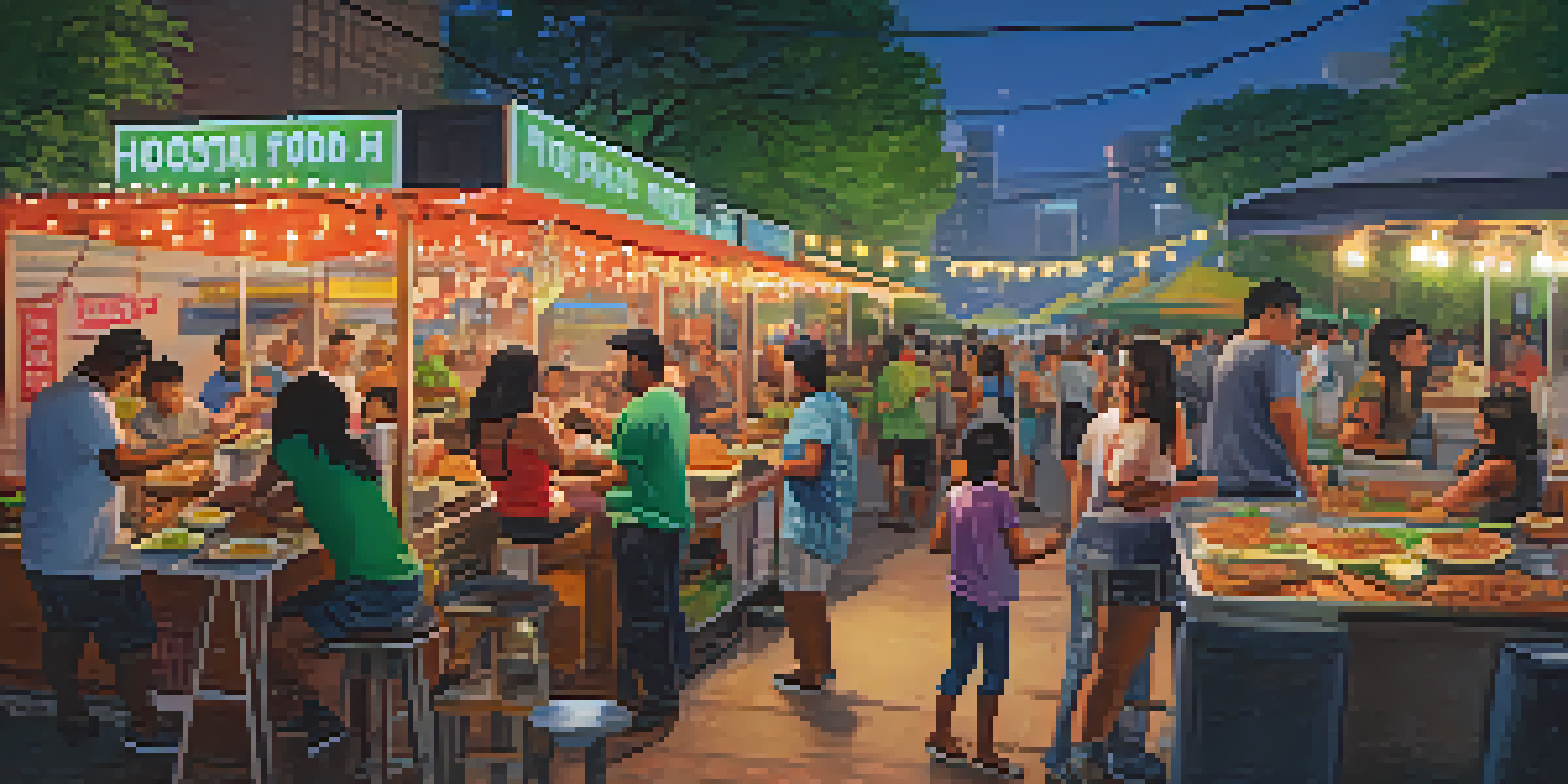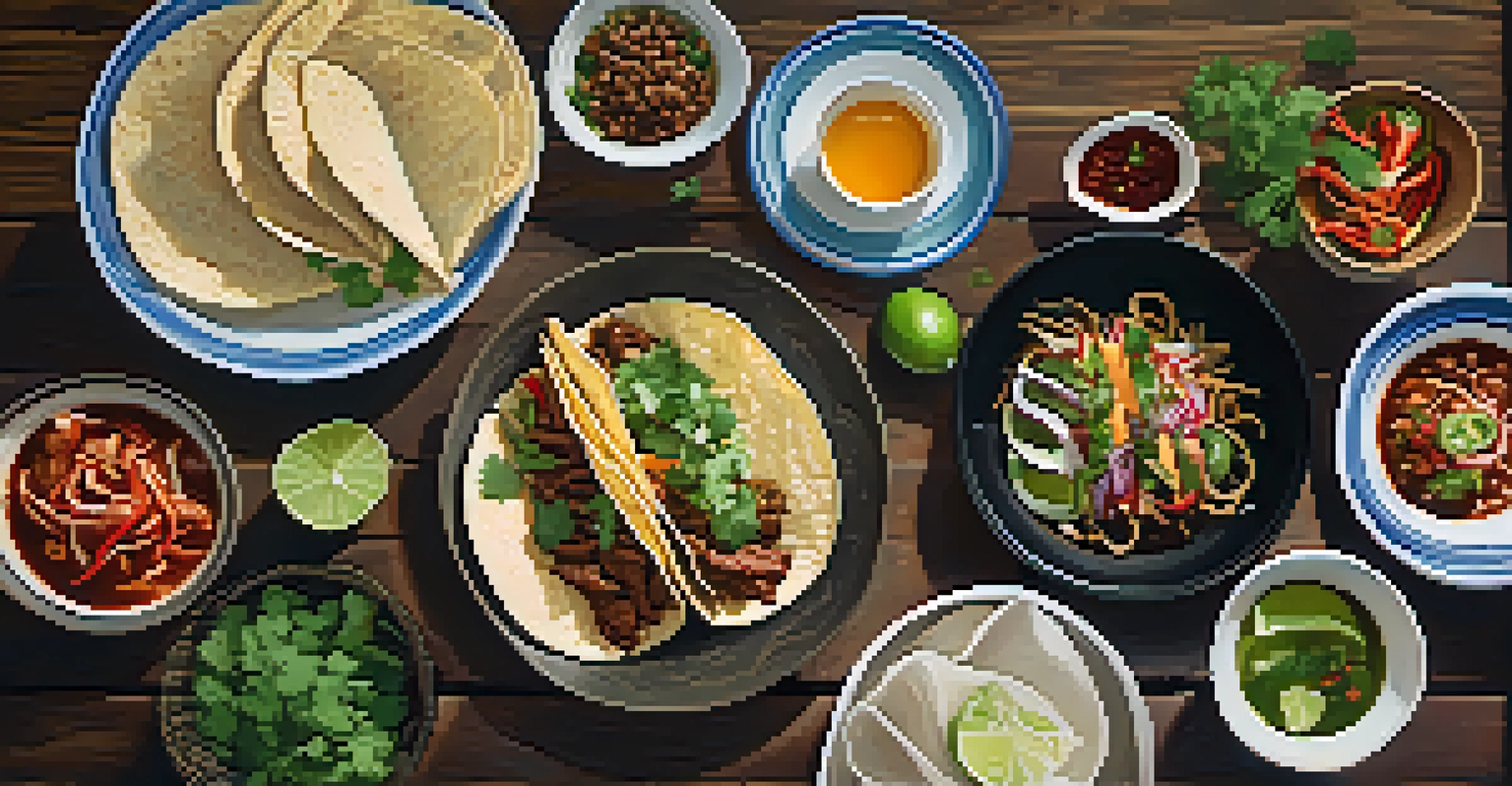The Influence of Ethnic Cuisines on Houston's Food Landscape

Houston: A Melting Pot of Culinary Traditions
Houston is often celebrated as one of the most diverse cities in America, and its food scene reflects this vibrant multiculturalism. With influences from Latin America, Asia, Africa, and beyond, the city has become a culinary tapestry where traditional recipes blend seamlessly. Each neighborhood tells a story through its eateries, showcasing flavors that span the globe, from tacos to pho.
Food is a universal language that brings people together, transcending borders and cultures.
This rich diversity is not just about the food; it’s about the stories and histories that come with each dish. For example, the popularity of Tex-Mex highlights the fusion of Texan and Mexican cultures, creating a unique dining experience that feels both familiar and exotic. Each bite connects diners to the cultural narratives that have shaped the community.
As you stroll through Houston, you can taste the world in just a few blocks. This accessibility to diverse cuisines invites exploration and appreciation, allowing locals and visitors alike to embark on a culinary adventure that reflects the city's dynamic spirit.
The Role of Immigrant Communities in Shaping Cuisine
Immigrant communities have played a crucial role in shaping Houston's food landscape, introducing unique flavors and cooking techniques that have become staples in the city. These communities often start small, with family-owned restaurants that serve authentic dishes from their homelands, acting as a gateway for others to explore new cuisines. Over time, these establishments grow, influencing broader culinary trends.

For instance, the rise of Vietnamese cuisine in Houston can be traced back to the influx of Vietnamese immigrants following the Vietnam War. Today, pho and banh mi are not just local favorites; they have become essential components of Houston’s culinary identity. This evolution showcases how immigrant cuisines can transition from niche to mainstream.
Diverse Cuisines Shape Houston's Food
Houston's culinary scene is a rich tapestry of flavors influenced by its multicultural population, inviting exploration and appreciation.
Additionally, these communities preserve traditional cooking methods while also adapting to local tastes and ingredients. This blending of cultures not only enriches the food scene but also fosters a sense of community, creating spaces where cultural exchange flourishes. Each meal tells a story of resilience, adaptation, and innovation.
Fusion Cuisine: A Creative Culinary Movement
Fusion cuisine has emerged as a significant trend in Houston, where chefs creatively blend elements from various culinary traditions. This innovative approach reflects the city’s diverse population and the willingness to experiment with flavors and techniques. For example, dishes like Korean BBQ tacos exemplify how culinary boundaries can be pushed to create something entirely new.
Cooking is like love. It should be entered into with abandon or not at all.
Restaurants across the city are embracing this fusion trend, often creating signature dishes that surprise and delight diners. This not only attracts adventurous eaters but also encourages a dialogue about cultural appreciation and culinary heritage. It’s a delicious way to celebrate diversity while honoring the roots of each cuisine.
Moreover, fusion cuisine often serves as a bridge between cultures, allowing people to discover and appreciate foods they may not have otherwise tried. This exchange promotes understanding and respect, making the dining experience in Houston not just about food, but about connection and community.
Farm-to-Table and Ethnic Ingredients
The farm-to-table movement has made its mark on Houston's ethnic cuisines, highlighting the importance of fresh, local ingredients while honoring traditional recipes. Many chefs are now sourcing produce from local farmers, integrating seasonal ingredients into their dishes. This approach not only enhances flavor but also supports the local economy.
By using fresh, locally-sourced ingredients, chefs can create authentic dishes that reflect the essence of various cultures, while also promoting sustainability. For instance, a Mexican restaurant might incorporate Texas-grown corn for their tortillas, creating a fusion of local and traditional flavors. This practice enriches the dining experience and fosters a sense of responsibility towards the environment.
Immigrants Drive Culinary Innovation
Immigrant communities play a vital role in shaping Houston's food landscape, introducing authentic dishes that evolve into local favorites.
Additionally, the emphasis on local sourcing has encouraged ethnic chefs to adapt their menus, creating innovative dishes that still pay homage to their culinary roots. This evolution demonstrates how traditional cuisines can thrive in a modern context, appealing to a growing audience that values both authenticity and sustainability.
The Impact of Food Festivals on Ethnic Cuisines
Food festivals have become a vibrant part of Houston's culinary culture, celebrating the city’s diverse ethnic cuisines while bringing communities together. Events like the Houston Food Fest and the Houston International Festival showcase the rich tapestry of flavors available in the city, allowing attendees to sample a wide array of dishes from various cultures. These festivals not only highlight culinary talent but also educate participants about different cultural traditions.
These gatherings also provide a platform for local chefs and restaurateurs to share their culinary stories, often leading to increased visibility and patronage for their establishments. This exposure can be especially beneficial for smaller, family-owned businesses that may struggle to compete with larger chains. Food festivals foster a sense of community pride and encourage residents to explore the culinary offerings in their own backyard.
Moreover, these events promote cultural exchange and appreciation, as attendees engage with the chefs and learn about the heritage behind each dish. They serve as a reminder of how food can bridge gaps between cultures, uniting people through shared experiences and delicious flavors. The impact of these festivals extends far beyond the plates, enriching the city’s cultural landscape.
The Influence of Social Media on Culinary Trends
Social media has transformed the way we discover and engage with food, especially in a diverse city like Houston. Platforms like Instagram and TikTok allow food lovers to showcase their favorite dishes, creating a buzz around local ethnic restaurants that might otherwise go unnoticed. This digital exposure has played a significant role in popularizing various cuisines, often leading to long lines at hidden gems across the city.
Additionally, social media allows chefs and restaurateurs to connect directly with their audience, sharing behind-the-scenes glimpses into their culinary processes and cultural stories. This transparency fosters a sense of community, as diners feel more connected to the people behind the food. When a dish goes viral, it can lead to an influx of new customers eager to try what they’ve seen online.
Social Media Boosts Local Food Trends
Social media platforms have transformed food discovery in Houston, helping local ethnic cuisines gain visibility and popularity among diners.
This phenomenon highlights the power of visual storytelling in the food industry, where enticing photos and videos can evoke cravings and inspire culinary adventures. As ethnic cuisines gain traction on these platforms, they help to shape Houston’s food culture, celebrating diversity in a way that is accessible and engaging for everyone.
Looking Ahead: The Future of Ethnic Cuisines in Houston
As Houston continues to grow and evolve, so too will its food landscape, particularly in the realm of ethnic cuisines. The city's commitment to celebrating diversity through food is likely to strengthen, with more chefs and restaurants emerging to share their cultural heritages. This trend not only enriches the local dining scene but also fosters an environment of inclusivity and understanding.
Moreover, as younger generations take an interest in their culinary roots, we can expect to see a revival of traditional dishes alongside innovative interpretations. This blending of old and new will keep the food scene fresh and exciting, inviting both locals and visitors to explore Houston’s culinary offerings. The future looks bright for those willing to experiment and embrace the flavors of different cultures.

In essence, the influence of ethnic cuisines on Houston’s food landscape is a testament to the city’s dynamic spirit. As we look ahead, it's clear that these culinary traditions will continue to flourish, inviting everyone to partake in a delicious journey of discovery and connection across cultures.